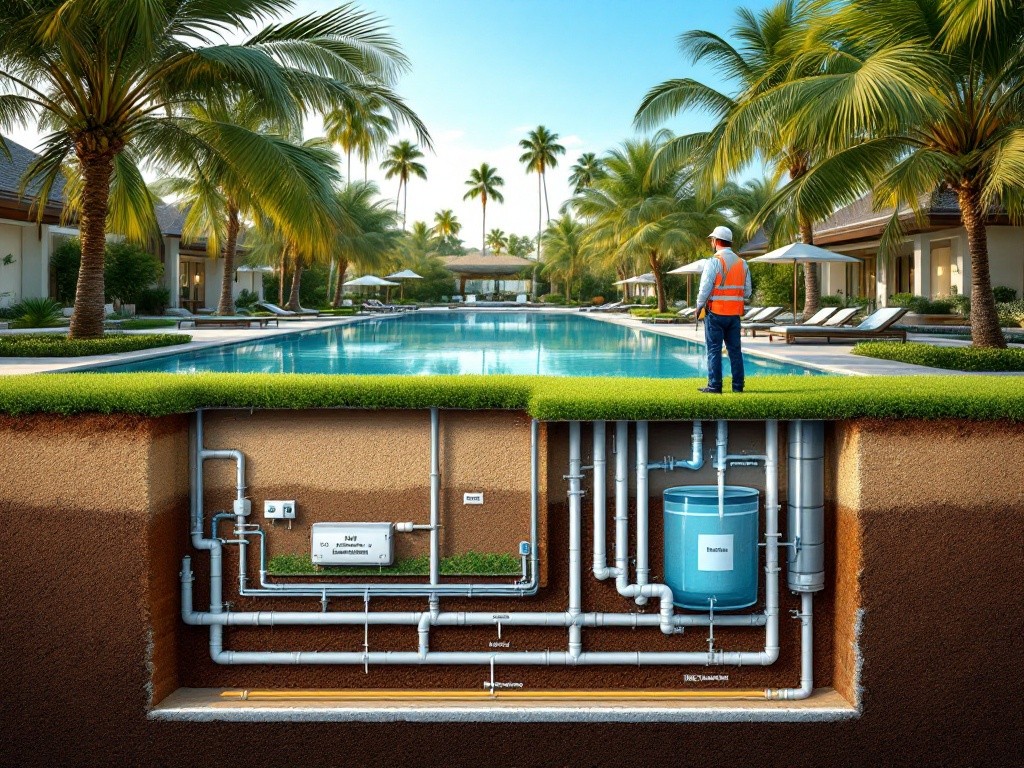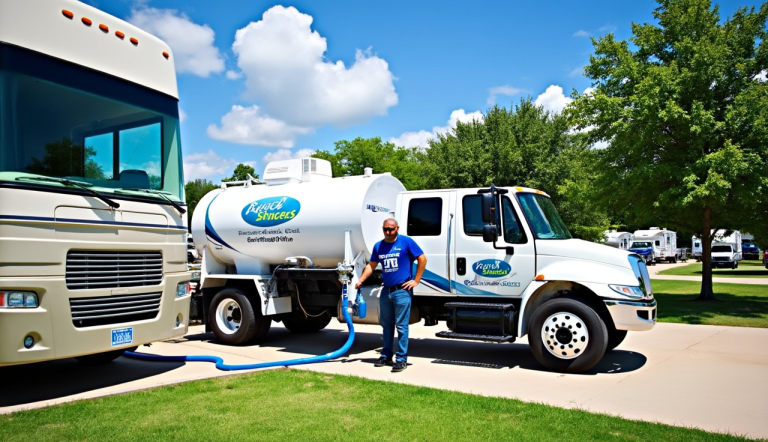Hotel and Resort Septic Services: Essential Guide
Hotel and Resort Septic Services Key Takeaways:
- Hotel and resort septic services require specialized maintenance due to high volume use
- Regular pumping and inspections are crucial for preventing system failures
- Grease traps play a vital role in protecting septic systems from restaurant waste
- Seasonal fluctuations in occupancy can impact septic system performance
- Professional septic services can help hotels maintain health code compliance
Hotel and resort septic services rely on properly functioning septic systems to handle the large volumes of wastewater generated by guests and facilities. Without regular maintenance, these systems can quickly become overwhelmed, leading to costly repairs, unpleasant odors, and potential health code violations. Let’s explore the essential septic services that hotels and resorts need to keep their wastewater systems running smoothly.
Understanding Hotel Septic System Challenges
Hotel and resort septic services face unique challenges compared to residential systems. The sheer volume of water and waste processed daily puts a significant strain on these systems. A typical hotel guest uses around 100 gallons of water per day, which is considerably more than the average home use. This high usage rate means hotel septic systems must be robust and well-maintained to handle the load.
Fluctuating Occupancy Rates
One of the biggest challenges for Hotel and resort septic systems is dealing with fluctuating occupancy rates. During peak seasons, the system may be pushed to its limits, while in off-seasons, it may be underutilized. This inconsistent use can lead to problems if the system isn’t properly designed and maintained.
Multiple Wastewater Sources
Hotel and resort septic services have multiple sources of wastewater, including guest rooms, restaurants, laundry facilities, and pools. Each of these sources contributes different types of waste that can impact the septic system in various ways. For example, kitchen grease can clog pipes, while chemicals from laundry or pool maintenance can disrupt the bacterial balance in the septic tank.
Essential Septic Services for Hotels and Resorts
To keep hotel septic systems functioning properly, several key services are essential:
Regular Septic Tank Pumping
Frequent pumping is crucial for hotel septic tanks. The high volume of waste means tanks fill up faster than residential systems. A professional septic service can assess the tank size and usage patterns to establish an appropriate pumping schedule. Professional Septic Tank Pumping
Grease Trap Maintenance
For hotels with on-site restaurants, grease trap maintenance is vital. Grease traps prevent fats, oils, and grease from entering the septic system, where they can cause clogs and backups. Regular cleaning of grease traps is necessary to ensure they continue to function effectively. Ultimate Grease Trap Pumping
System Inspections and Monitoring
Regular inspections can catch potential issues before they become major problems. Professional Hotel and resort septic systems use advanced tools like cameras and sensors to assess the condition of pipes, tanks, and drain fields. Septic System Inspections
Drain Field Care
The drain field is a critical component of the septic system. For hotels, it’s important to protect this area from damage. This might include redirecting foot traffic or vehicle paths to avoid compacting the soil over the drain field.
Seasonal Considerations for Hotel Septic Services
Hotel and resort septic systems often experience seasonal changes in occupancy, which can impact their septic systems. Here’s how to address these fluctuations:
Preparing for Peak Seasons
Before a busy season, it’s wise to have the septic system thoroughly inspected and pumped if necessary. This ensures the system is ready to handle the increased load.
Maintaining During Low Seasons
During slower periods, it’s important not to neglect the Hotel and resort septic systems. Regular maintenance should continue, and steps may need to be taken to keep the bacterial balance in the tank healthy despite reduced use.
Innovative Solutions for Hotel Septic Systems
As technology advances, new solutions are becoming available for hotel septic management:
Smart Monitoring Systems
Some hotels are implementing smart monitoring systems that provide real-time data on septic system performance. These systems can alert management to potential issues before they become serious problems.
Water Conservation Measures
Installing water-saving fixtures and educating guests about conservation can significantly reduce the load on the septic system. This not only helps the environment but also extends the life of the septic system.
The Role of Professional Septic Services
Professional septic services play a crucial role in maintaining hotel and resort wastewater systems. These experts have the knowledge and equipment to handle the unique challenges of large-scale septic systems.
Customized Maintenance Plans
A professional service can develop a customized maintenance plan tailored to the specific needs of each hotel or resort. This plan takes into account factors like system size, usage patterns, and local regulations.
Emergency Response
In the event of a Hotel and resort septic services failure, quick response is essential to minimize disruption to hotel operations. Professional services often offer 24/7 emergency support to address urgent issues.
Health and Safety Compliance
Proper Hotel and resort septic services maintenance is crucial for hotels to comply with health and safety regulations. Failure to maintain the system can lead to serious consequences:
Avoiding Health Code Violations
A malfunctioning Hotel and resort septic systems can quickly lead to health code violations. Regular maintenance helps hotels avoid these issues and the potential fines and reputation damage that come with them.
Protecting Guest Health
A well-maintained septic system protects the health of guests and staff by properly treating wastewater and preventing the spread of harmful bacteria.
Environmental Considerations
Hotel and resort septic services have a responsibility to protect the local environment from the impacts of their wastewater:
Protecting Local Water Sources
Proper septic system maintenance helps prevent contamination of groundwater and nearby water bodies, which is especially important for resorts in sensitive ecological areas.
Sustainable Practices
Some hotels are adopting more sustainable wastewater practices, such as using treated wastewater for irrigation or implementing advanced treatment systems that produce cleaner effluent.
Cost Considerations for Hotel Septic Services
While regular septic maintenance does represent an ongoing cost for hotels, it’s important to consider the long-term financial benefits:
Preventing Costly Repairs
Regular maintenance can prevent major system failures that could result in expensive repairs or even complete system replacement.
Avoiding Revenue Loss
A septic system failure can force a hotel to close temporarily, resulting in significant lost revenue. Proper maintenance helps avoid these costly interruptions.
Training Hotel Staff on Septic System Care
Educating hotel staff about proper septic system care can help prevent many common issues:
Proper Disposal Practices
Staff should be trained on what can and cannot be disposed of in drains and toilets. This is especially important for housekeeping and kitchen staff.
Recognizing Warning Signs
Staff should be aware of the signs of septic system problems, such as slow drains or unpleasant odors, and know how to report these issues promptly.
Planning for Future Growth
As hotels expand or renovate, it’s important to consider the impact on the septic system:
Assessing System Capacity
Before adding new rooms or facilities, hotels should have their septic system assessed to ensure it can handle the increased load.
Upgrading When Necessary
In some cases, expansion may require upgrading the septic system. Planning for this in advance can help avoid unexpected costs and delays.
The Impact of Guest Behavior on Hotel Septic Systems
While hotels can control many aspects of their septic system maintenance, guest behavior can also have a significant impact:
Educating Guests
Providing gentle reminders about proper waste disposal can help prevent guests from flushing inappropriate items that could damage the septic system.
Balancing Comfort and Conservation
Hotels need to find ways to encourage water conservation among guests without compromising on comfort and luxury.
Septic System Alternatives for Hotels and Resorts
In some cases, traditional septic systems may not be the best option for hotels:
Advanced Treatment Systems
Some hotels are opting for advanced wastewater treatment systems that can handle higher volumes and produce cleaner effluent.
Connection to Municipal Systems
For hotels in more developed areas, connecting to municipal sewer systems might be a viable alternative to maintaining a private septic system.
Here’s a table comparing different types of septic systems suitable for hotels and resorts:
| System Type | Capacity | Maintenance Needs | Best For |
|---|---|---|---|
| Conventional Septic | Medium | Regular pumping, inspections | Smaller hotels, rural areas |
| Aerobic Treatment | High | Frequent monitoring, part replacement | Large resorts, environmentally sensitive areas |
| Mound System | Medium | Regular inspection, pump maintenance | Hotels in areas with high water tables |
| Recirculating Sand Filter | High | Filter cleaning, pump maintenance | Eco-resorts, areas with strict environmental regulations |
Here’s another table showing the frequency of common septic services for hotels:
| Service | Small Hotel (< 50 rooms) | Large Resort (> 200 rooms) |
|---|---|---|
| Tank Pumping | Every 6-12 months | Every 3-6 months |
| Grease Trap Cleaning | Monthly | Weekly |
| System Inspection | Annually | Bi-annually |
| Drain Field Assessment | Every 2-3 years | Annually |
Here’s a list of warning signs that hotel staff should be aware of regarding septic system issues:
- Slow-draining sinks or showers
- Gurgling sounds in the plumbing
- Unpleasant odors near the drain field or septic tank
- Wet or mushy ground over the drain field
- Backing up of sewage in toilets or drains
- Bright green, spongy grass over the septic system, even during dry weather

Conclusion
Maintaining a Hotel and resort septic systems requires a proactive approach and regular professional service. By understanding the unique challenges these systems face and implementing a comprehensive maintenance plan, hotels can ensure their septic systems continue to function efficiently, protecting guest health, the environment, and their bottom line. Scheduled Maintenance Programs
Regular pumping, inspections, and staff training are all key components of a successful hotel septic management strategy. With proper care, a Hotel and Resort Septic Services can operate smoothly, allowing the property to focus on providing excellent guest experiences without worrying about wastewater issues. For more information, you can visit our website or contact us.




 Texway Wastewater Services is a septic, wastewater, and excavation company based out of Burleson, Texas and serving the surrounding areas. We specialize in
Texway Wastewater Services is a septic, wastewater, and excavation company based out of Burleson, Texas and serving the surrounding areas. We specialize in